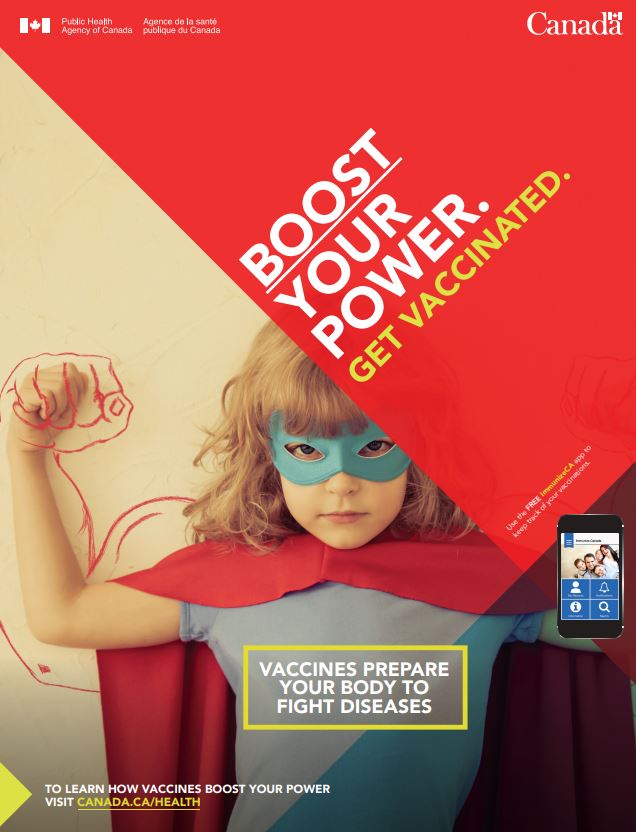“How many is too many? Who decides? Educate before you vaccinate,” read a billboard near downtown Toronto’s busy Yonge-Dundas Square earlier this week.

The billboards, which have since been taken down, were part of an advertising campaign by a group called Vaccine Choice Canada. According to a statement sent to Global News earlier this week, the intention was to “encourage Canadians to better educate themselves on the medical practice of vaccination so that their consent is truly informed.”
“Two of the billboards ask questions which we hope will stimulate parents to do more in depth research,” wrote Ted Kuntz of Vaccine Choice Canada. “We would hope that every politician and every public health official would encourage the public to ‘educate before they vaccinate.’”
Health experts say though that not only are vaccines safe, but that education would make people more in favour of vaccination, not less.
“They use fear and misinformation to push a science-free agenda. A critical assessment will lead people toward, not away, from vaccination,” said Timothy Caulfield, Canada research chair in health law and policy, and author of The Vaccination Picture.
WATCH: Cracking down on vaccination misinformation from naturopaths

“My issue would be that it’s wrong. Completely,” said Dr. Nicole Le Saux, chair of the Canadian Paediatric Society’s infectious diseases and immunization committee.
“Millions and millions of people, children and adults, have received vaccines that have prevented illness and death and so to get a snippet of some kind of, ‘Watch out,’ or some kind of nuanced message like we’re getting too many vaccines, is really harmful.”

Get weekly health news
“They have manipulated the message to sow this seed of doubt.”
But who’s listening?
Tara Hills is a mother of nine from Arnprior, Ontario, and she used to be vaccine-hesitant. Messages like these billboards, and personal testimonials on social media, helped grow her doubts, she said.
“What is effective is a good hook. And what’s a good hook? What would make me stop and click and read something is if it emotionally connects with me,” she said.
“If it’s personal like, ‘My Baby Almost Died…’ click, click, click.”
And when she read several stories, they stayed in her mind and came into conversations with others. “It was just enough to stir up doubt.”
“The problem is that there is a measurable portion of Canadian society that is vaccination-hesitant,” Caulfield said. In a survey done for Health Canada in 2017, one in three parents expressed having some kind of doubt or concern about vaccinating their child. One in 10 said they had refused or delayed getting some vaccines for their children.
And right now, Vancouver is dealing with an outbreak of measles in schools which had low vaccination rates.
“The problem is that the message from the hardcore anti-vaxxers can have an influence on that community,” Caulfield said. “Just being exposed to a conspiracy theory, even if you’re not a conspiracy theorist yourself, can have an influence on vaccination hesitancy. Being exposed to false balance in the media, a falsely balanced portrayal of the science, can have an impact on vaccination hesitancy.”
Countering those messages is a tall order, because the stories are so emotionally compelling, he said.
WATCH: Changing minds on kids and vaccinations

Hills’ sister, Meggan Larson, also had doubts about vaccines. “I would say that the reason I don’t discount vaccine injury posts on Facebook is because I am friends with more than one person who claims to have a child that was harmed due to vaccines,” she wrote in an email.
“The parents of vaccine injured children are so loud online that they make it seem like the occurrence is much more common than it actually is. When that’s ignored, it seems like the vaccine companies aka ‘big pharma’ is trying to cover things up.”
She thinks that peoples’ concerns about vaccine safety shouldn’t be dismissed, but that they should be given clear information from the government on how the risks of vaccination compare to the risks of catching a disease.
“The vaccine injury posts are full of fear and what if’s and they have made the fear of a vaccine-related injury far greater than the fear of catching one of the diseases.”
Both Larson and Hills think that public-health officials should also think about adding a little fear into their messages. “They’ve got all the stats. All the weight of evidence is on their side,” Hills said.
But she doesn’t think people respond to stats or simple positive messages about the benefits of vaccination.
“Start showing people what happens when you don’t vaccinate,” she said. She thinks pictures of people with polio, or sound clips of babies with whooping cough, could change people’s minds in the same way as anti-smoking ads showing diseased lungs did.
“I’m not really going to read a bunch of stats from either party. But I will read a story that connects with me on an emotional level.”
“Maybe we haven’t done such a great job in communicating the absolute benefit and medical success in prolonging life that vaccines have given us,” Le Saux said. Better science education and lessons on vaccination in schools would help, she thinks.
Although she’s not sure about whether an anti-tobacco style campaign is the way to go, she thinks that public health’s messages could be better.
“I think promoting the benefits of vaccines should be enough, but maybe I’m wrong. Maybe there should be more messaging about if you don’t do this, this will happen.”



Comments
Want to discuss? Please read our Commenting Policy first.